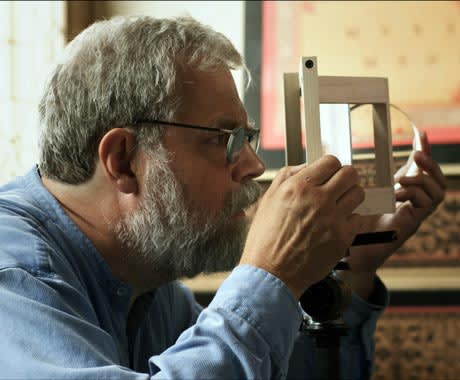A natural fit for his joke-y brand of demystifying the incredible, one half of the bane of the stage magicians' community, Penn and Teller, documents the attempt of his good friend, Tim Jenison, to replicate the style of famous Dutch painter Johannes Vermeer.
The catch: Tim isn't a painter whatsoever. What he is, is a scientist. As an expert in the field of optics, Tim, partially inspired by the work of two art historians, thinks he's just about cracked the technological innovation he's certain Vermeer used to achieve the uncanny luminescence of his paintings.
Starting from the idea that Vermeer used some sort of camera obscura or at least a lens, the prodigiously clever, indomitable-to-the-point-of-insanity scientist goes about experimenting and attempting to recreate the conditions the original artist would have been working under as accurately as possible.
This zealous pursuit for optimum authenticity leads Tim to learn Dutch, woodworking, how to make paint from scratch and dozens of other skills the average person wouldn't acquire without monetary incentive. As much as this is an obsessive, serious study on the work of Vermeer and how inextricable art and science have been historically linked, Teller knows that his long-time buddy is a fascinating enough character to carry a documentary on his own.
Understanding his subject's sense of humour as only a close friend can, and being a person that makes his living on comedic timing, Teller uses abrupt editing and Tim's witty asides to set up laughs throughout the picture. Clipping along at a brisk pace, as the experiment yields promising results, the film loses some momentum once the process of actually recreating Vermeer's "The Music Lesson" begins.
Enraptured by his friend's extraordinary effort, Teller spends a bit too much time lingering on sessions of countless tiny brush strokes. Augmenting the project's practical thesis, Teller, who serves as narrator and makes the occasional appearance in front of the camera, considers the illusory divide between art and science, using Tim's thoughts to illustrate, along with many historical examples of the two disciplines working in concert, intentionally avoiding any talk of Da Vinci.
It's a logical complementary topic to examine while deconstructing a modern meeting of the forms. Tim's Vermeer isn't especially vital, but it's certainly entertaining.
(Mongrel Media)The catch: Tim isn't a painter whatsoever. What he is, is a scientist. As an expert in the field of optics, Tim, partially inspired by the work of two art historians, thinks he's just about cracked the technological innovation he's certain Vermeer used to achieve the uncanny luminescence of his paintings.
Starting from the idea that Vermeer used some sort of camera obscura or at least a lens, the prodigiously clever, indomitable-to-the-point-of-insanity scientist goes about experimenting and attempting to recreate the conditions the original artist would have been working under as accurately as possible.
This zealous pursuit for optimum authenticity leads Tim to learn Dutch, woodworking, how to make paint from scratch and dozens of other skills the average person wouldn't acquire without monetary incentive. As much as this is an obsessive, serious study on the work of Vermeer and how inextricable art and science have been historically linked, Teller knows that his long-time buddy is a fascinating enough character to carry a documentary on his own.
Understanding his subject's sense of humour as only a close friend can, and being a person that makes his living on comedic timing, Teller uses abrupt editing and Tim's witty asides to set up laughs throughout the picture. Clipping along at a brisk pace, as the experiment yields promising results, the film loses some momentum once the process of actually recreating Vermeer's "The Music Lesson" begins.
Enraptured by his friend's extraordinary effort, Teller spends a bit too much time lingering on sessions of countless tiny brush strokes. Augmenting the project's practical thesis, Teller, who serves as narrator and makes the occasional appearance in front of the camera, considers the illusory divide between art and science, using Tim's thoughts to illustrate, along with many historical examples of the two disciplines working in concert, intentionally avoiding any talk of Da Vinci.
It's a logical complementary topic to examine while deconstructing a modern meeting of the forms. Tim's Vermeer isn't especially vital, but it's certainly entertaining.




